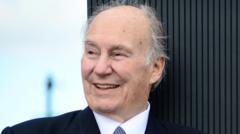Following their refusal to take the King's oath, Dawson City's council has led to a legislative change in Yukon, allowing elected officials to pledge allegiance to Canada's constitution instead. This decision reflects ongoing dialogues around indigenous rights and colonial legacies.
Dawson City Advocates for Alternative Oath Amid Indigenous Concerns

Dawson City Advocates for Alternative Oath Amid Indigenous Concerns
Yukon introduces a constitutional oath option for municipal officials following council's refusal to pledge allegiance to the Crown, igniting discussions on Canada's colonial history.
In a significant shift for municipal governance, Dawson City, a small town in Canada’s Yukon territory, has initiated an alternative to the traditional oath of allegiance to the British Crown. This change follows a notable protest from the newly-elected council, which included an indigenous member who highlighted Canada’s complicated and often painful history with indigenous peoples.
Previously, elected officials in Canada, a Commonwealth nation, were required to swear allegiance to the monarchy, specifically His Majesty King Charles III and his legal heirs. However, the new regulations now provide an option for municipal elected officials to affirm their loyalty to the Canadian constitution instead. Richard Mostyn, Yukon’s minister of community services, emphasized that this legislative update is intended to reflect the evolving values and identities of Canadian society.
The necessity for change became apparent when Dawson City's newly elected council could not proceed without taking the mandatory oath, which must be completed within 40 days of election, thereby risking nullification of their victories. The specific deadline was set for December 9, compelling officials to seek a resolution.
Tr’ondëk Hwëch’in First Nation Councillor Darwyn Lynn expressed his discomfort with the requirement, emphasizing the tumultuous history surrounding the Crown's role in Canada. He shared his struggles with the oath, stating, “I read it probably about 15 times, and it didn’t get any easier to do." His hesitation ultimately sparked essential discussions not only within Dawson City, home to about 2,400 residents, but across the broader Yukon region as well. Lynn noted that the conversations surrounding the oath and its implications were constructive, with various perspectives being shared openly.
Dawson City officials are expected to take their chosen oath shortly, marking a potential change in the cultural and political landscape of municipal governance. This development echoes similar amendments from other jurisdictions in Canada — acknowledged for challenging outdated colonial practices. For instance, Quebec passed legislation in 2022 that ended the oath of allegiance to the monarchy for elected officials, a move welcomed by some as a progressive reform.
While the new flexibility concerning the oath reflects a growing recognition of historical grievances, the traditional requirement continues for members of Canada's national parliament and many provincial legislative assemblies. With ongoing debate around the implications of these oaths, Dawson City’s decision could pave the way for more extensive discussions about the intersections of governance, identity, and reconciliation in Canada.





















